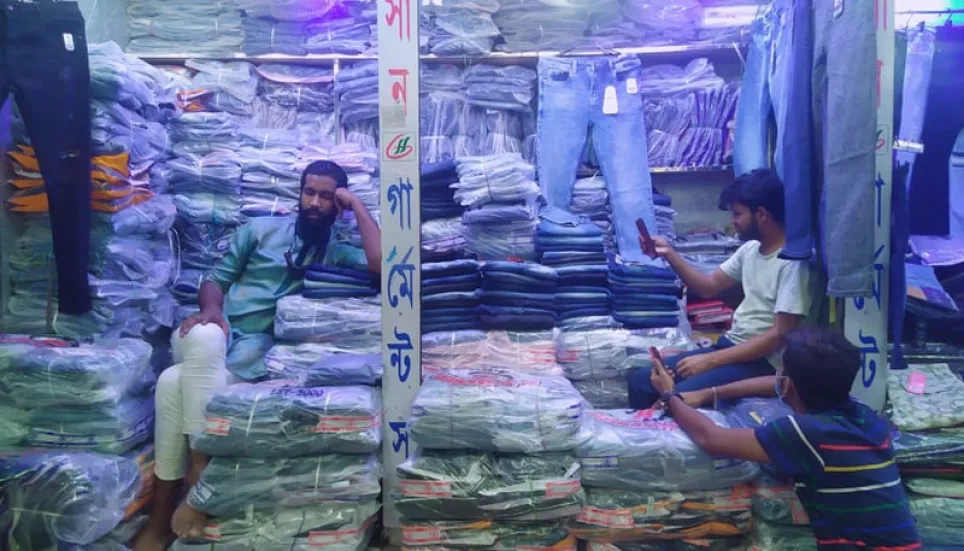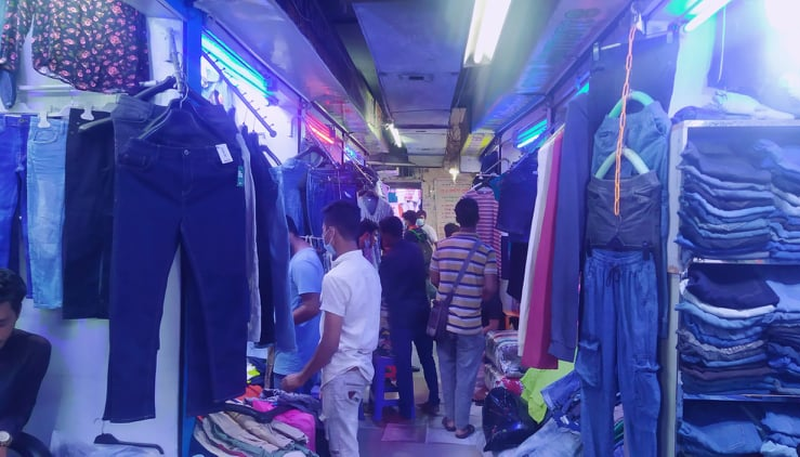
Rifat Islam
Bangabazar, a large, chaotic clothing market at Gulistan in the capital that provides plenty of scope for bargain hunting for the retail and wholesale buyers, is now facing a bleak period in business due to an ongoing nationwide lockdown.
Wholesalers on Monday were seen sitting idle at shops of the market with stacks of products piled behind them, whereas the month of Ramadan accounts for almost 60 to 70 per cent of their sales every year.
The market that sells secondhand and factory overruns along with fresh outfits is renowned for selling footwear, readymade garments (shirts, pants, trousers, t-shirts, jackets, hosiery, sweaters, etc), salwar-kameez and saris at cheap prices in both wholesale and retail trade.
Before the Covid-19 pandemic hit, retail sellers from around the country would come a week before Shab-e-Barat and place their orders to purchase products from Bangabazar. If business was good after the first 10 days of Ramadan, they would come back with more orders.

However, this year the picture looks grim for Bangabazar traders as the government imposed a nationwide lockdown, gradually extending it further, and restrictions on public transportations.
“We are currently catering a handful of buyers from some street markets, malls and shopping centres in Dhaka and nearby districts. But our biggest buyers from around Bangladesh are unable to come because of the transportation ban,” said Mohammad Rana, proprietor of Nujha Fashion.
According to the wholesale traders, their profit margin has come down to 4 to 5 per cent from 10 to 20 per cent. On top of this, they have to pay rent, utility bills and salary to their staff. The overall cost of running a shop varies from Tk 70 thousand to Tk 1 lakh depending on the position and the area of the shop.
“I used to sell Tk 1 to Tk 1.5 lakh worth of products every day, now I’m struggling to sell even Tk 50-thousand worth of products,” says Belayet Hossain of Star Sharee House, who stacked Tk 20 lakh worth of new products in his shop.
In this market, each salwar suit costs Tk 250-1200 in wholesale price, whereas jeans pants for both men and women cost Tk 120-500. A set of these products contain 6 to 10 pieces of different sizes.
These products sell at double or triple prices in retail markets.
A shirt sold at Tk 280 at Bangabazar is found to be sold at Tk 400 at New Market. On the other hand, a pair of jeans pants bought at a wholesale rate of Tk 350 sells at Tk 650 at Noorjahan Market in the capital.
Apart from selling garments made products, locally made clothes are usually in high demand at the market.
Nannu Market at Mirpur 11 has emerged as a competitor for Bangabazar for selling wholesale clothes at a cheap rate. However, the traders of Bangabazar are reluctant to think of it as a competitor, claiming that Nannu Market mainly sells local products.
According to the Bangabazar sellers, Nannu Market products, even after having more innovative designs, are inferior to the garments products they sell.

A thin number of customers are seen at a readymade clothes market in Dhaka ahead of Eid festivals. – The Business Post Photo.
Bangabazar, once flocked by foreign shoppers for quality products at cheap rates, is no longer a favourite shopping destination for foreigners.
"For the last seven to eight years, I don’t see many foreigners except for Nigerians, Bhutanese and Indians," said 65-year-old Shohidul Islam who is doing business for more than 20 years in Bangabazar.
He thinks this has happened because of a change in the taste of attires.
The market began its journey in 1965 as a trading spot surrounding a former rail station. The 21,250 sq ft area developed as a garments market between 1985 and 1990.
Consisting of approximately 2,200 shops, it incorporated four shopping centres -- Bangabazar, Gulistan, Mahanagari and Adarsha Hawkers Market, and together they are popularly known as Bangabazar.
This old and shabby market, which was gutted by fire once in 1995; was declared extremely risky in terms of fire security by the Directorate General of Fire Service and Civil Defense in April 2019.